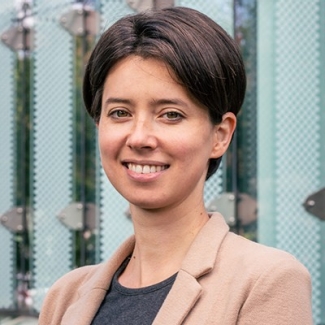The total award value including additional infrastructure funding exceeds $5M

Concordia is now home to five additional Canada Research Chairs (CRCs), whose funding is worth a total $3 million over five years and whose research topics span chemistry and biochemistry, cinema, biology, physics and psychology.
Professors Melissa Passarelli, Ishita Tiwary, Elena Kuzmin, Rachael (Ré) Mansbach and Nicole Alberts are the most recent recipients of the prestigious CRC title. As the website explains, "Chairholders aim to achieve research excellence in engineering and the natural sciences, health sciences, humanities, and social sciences."
The new CRCs were also awarded additional funding through the Canada Foundation for Innovation's John R. Evans Leaders Fund to support their research infrastructure needs.
The extra infrastructure funds, which include a matching contribution from the Ministère de l'Économie et de l'Innovation as well as support from Concordia and other sources, add $2.06 million to the CRC awards for a combined value of more than $5 million.
Concordia now has 27 Canada Research Chairs.
"The university is known for the depth of research knowledge and the specialized expertise of our faculty, so it is wonderful to see that recognized with five additions to this very notable list," says Paula Wood-Adams, interim vice-president of research and graduate studies.
"I congratulate them, and I have no doubt that they will continue to make important breakthroughs in their respective fields."
Meet the latest Concordia CRCs
 Photo by David Ward
Photo by David Ward
Melissa Passarelli
Assistant professor, Department of Chemistry and Biochemistry
Canada Research Chair in Spatial Omics: from Single-cell to Clinical Innovations (Tier 2)
Melissa Passarelli's research is focused on the advancement of spatial omics in clinical applications.
State-of-the-art imaging mass spectrometry techniques will be used to study diseases with high chemical specificity and sub-cellular spatial resolution.

Ishita Tiwary
Assistant professor, Mel Hoppenheim School of Cinema
Canada Research Chair in Media and Migration (Tier 2)
Ishita Tiwary's research examines the relationship between migratory processes, media technologies and modes of representation, which together shape the experiences of and public responses to migration. The project will include a community-driven research space, an interactive digital platform and a community library.

Elena Kuzmin
Assistant professor, Department of Biology
Canada Research Chair in Synthetic and Functional Genomics (Tier 2)
Elena Kuzmin will investigate how phenotypes and disease states emerge from the interplay of genetic determinants.
Her vision is to build a unified, translational approach for studying complex genetic interactions in yeast and human cells.

Rachael (Ré) Mansbach
Assistant professor, Department of Physics
Canada Research Chair in Computational Physics/Biophysics (Tier 2)
Rachael (Ré) Mansbach's research interests lie in physics-based design of therapeutics. Their lab group uses computational techniques such as molecular dynamics simulations and machine learning to understand and design novel search spaces for short proteins and small molecules.

Nicole Alberts
Associate professor, Department of Psychology
Canada Research Chair in Behavioural Health Intervention (Tier 2)
Nicole Alberts's research aims to improve behavioural health outcomes among individuals across the lifespan - with a focus on those diagnosed with childhood cancer. She will use cutting-edge digital health approaches to develop and test innovative interventions targeting chronic pain and psychological outcomes such as anxiety.
Learn more about Concordia's research chairs and research at Concordia.






